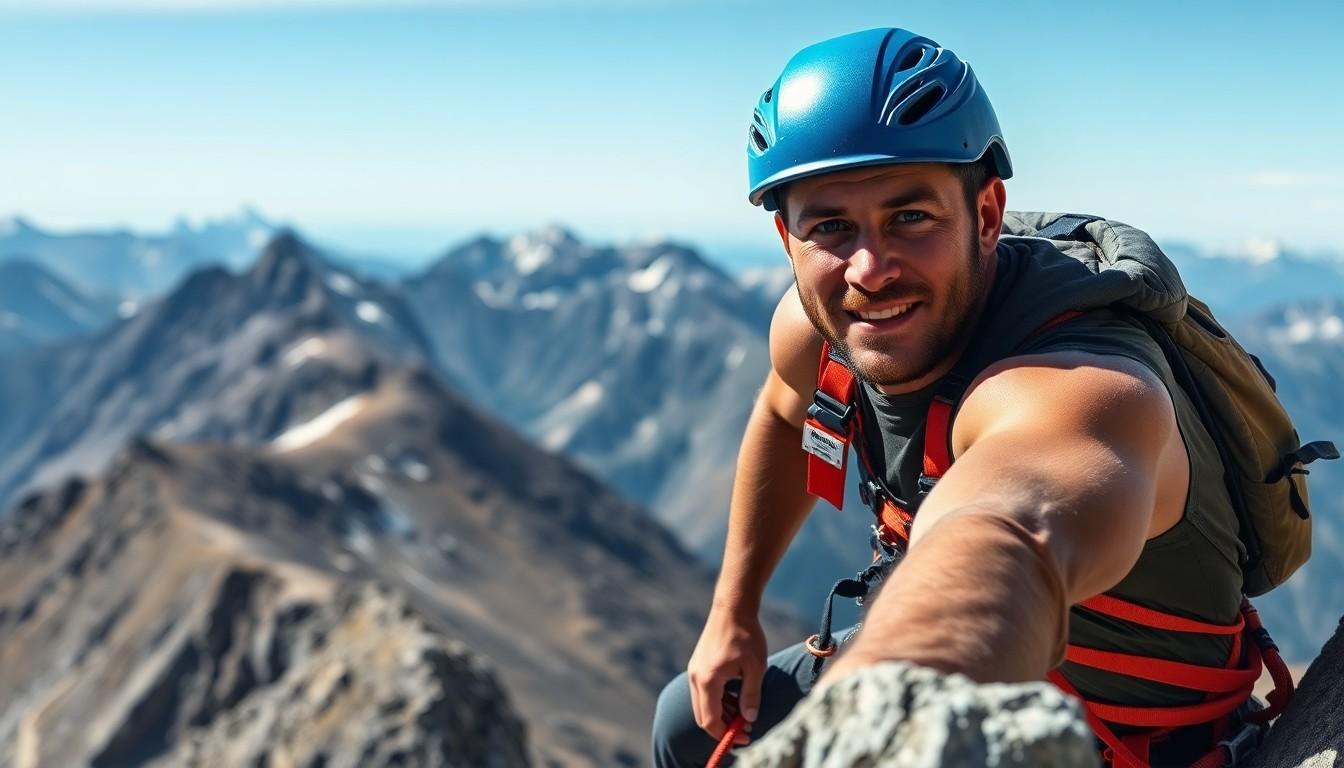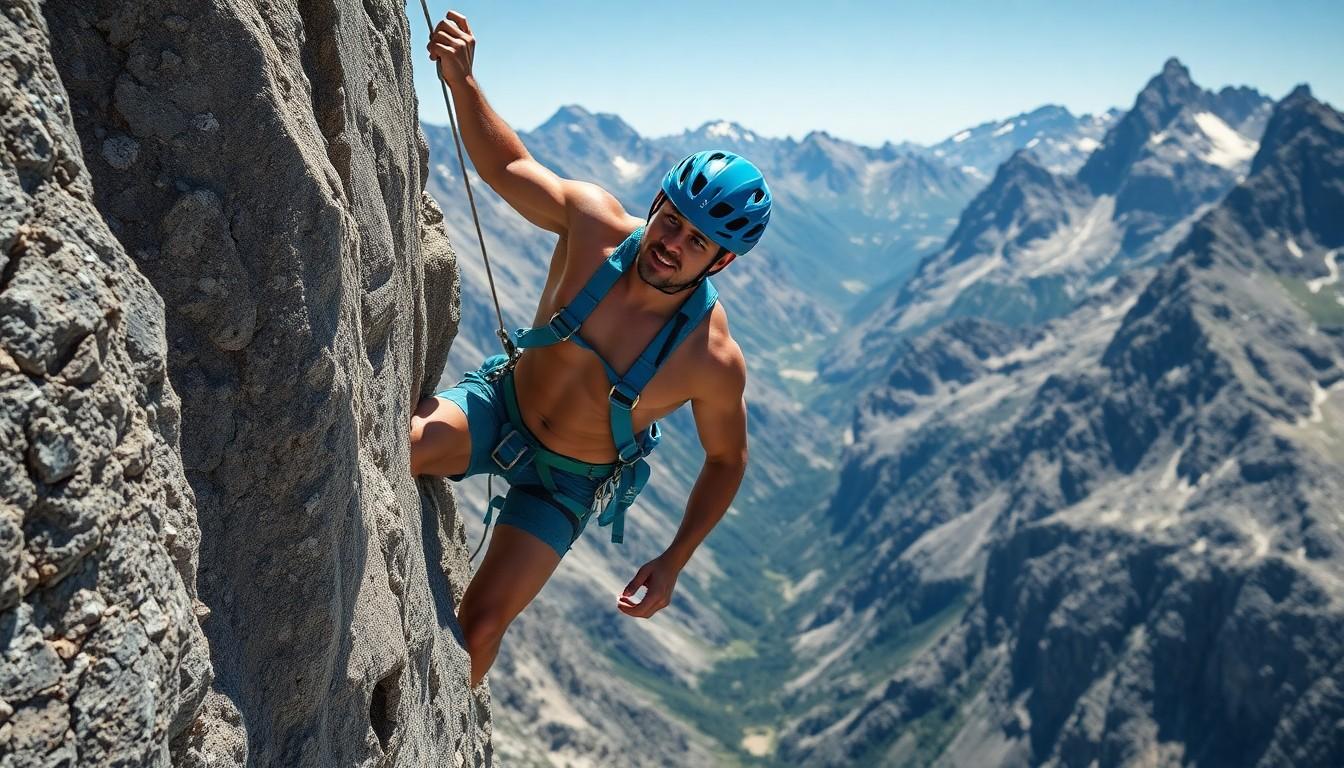Ever watched a mountain athlete in action and thought, “How do they make scaling a cliff look so easy?” These daredevils redefine what it means to be fit, blending strength, endurance, and a sprinkle of insanity. Whether they’re rock climbing, trail running, or skiing down steep slopes, mountain athletes push their limits while making it look like a walk in the park—albeit a park with a 90-degree incline and a few loose boulders.
Mountain Athlete
Mountain athletes excel in a variety of demanding sports, including rock climbing, trail running, and skiing. These individuals demonstrate exceptional physical prowess through their strength, endurance, and mental resilience. They often train rigorously to master their skills and adapt to changing environments and weather conditions.
Rock climbers rely on upper body strength and grip to ascend challenging routes. Trail runners frequently navigate uneven terrain, requiring agility and cardiovascular fitness. Skiers face steep descents, which demand balance and technique to maneuver safely. These activities not only require physical fitness but also emphasize mental focus and strategic planning.
Coaches and trainers play vital roles in helping mountain athletes achieve their goals. They design tailored training programs that enhance performance and reduce injury risk. Nutrition also holds importance; proper fueling maximizes energy reserves and aids recovery.
Competitive events showcase the skills of mountain athletes. Events such as climbing competitions and trail races attract participants seeking to challenge themselves and achieve personal bests. Each athlete’s journey showcases dedication, perseverance, and a love for the mountains.
Community support enhances the experiences of mountain athletes. Groups and organizations often offer a network for sharing knowledge and resources. Workshops and meetups foster camaraderie, encouraging skill development and safety awareness.
Mountain athletes contribute to the sports culture through their achievements and stories. Their exploits inspire others to engage in outdoor activities. The lifestyle promotes not only physical health but also a deeper connection with nature.
Characteristics of Mountain Athletes

Mountain athletes possess distinct traits that enable them to excel in challenging outdoor activities.
Physical Attributes
Physical attributes play a pivotal role in the performance of mountain athletes. Strength significantly enhances their ability to climb steep terrains or navigate rocky paths. Endurance allows them to tackle longer routes with sustained energy. Agility contributes to their ability to swiftly adjust their movements on uneven surfaces. Cardiovascular fitness supports high-intensity efforts, particularly in activities like trail running. Coordination integrates these physical qualities, ensuring fluid motion during complex maneuvers. Core stability provides balance and control, especially on technical descents. Each physical component intertwines to create well-rounded athletes capable of handling extreme sports.
Mental Resilience
Mental resilience is crucial for mountain athletes, significantly influencing their success. Focus enables them to concentrate on their performance, minimizing distractions during intense activities. Adaptability helps them adjust strategies when faced with unexpected challenges, such as changing weather conditions. Determination drives them forward, encouraging persistence when fatigue sets in. Confidence assures them of their abilities, fostering a positive mindset amidst difficulties. Strategic thinking allows for effective decision-making, optimizing route choices and risk management. Each mental quality works together, empowering athletes to overcome obstacles and achieve their goals.
Training Regimens for Mountain Athletes
Training regimens for mountain athletes combine various elements to enhance performance in demanding sports. Each training component targets specific physical and mental aspects crucial for success.
Endurance Training
Endurance training stands at the core of any mountain athlete’s regimen. It focuses on enhancing cardiovascular fitness through specific exercises like long-distance running and cycling. Incorporating interval training maximizes stamina by alternating between high and low-intensity bursts. Trail running offers practical experience on uneven terrain, improving agility while building up endurance. Sessions typically range from 45 minutes to several hours, depending on the event’s demands. Athletes often target up to 20 miles per week for optimal results.
Strength and Conditioning
Strength and conditioning play significant roles in a mountain athlete’s performance. Targeted exercises improve core stability, balance, and overall strength. Weight training includes squats, deadlifts, and kettlebell swings, which enhance lower body power essential for climbing and skiing. Upper body strength is developed through pull-ups, push-ups, and resistance band workouts. Incorporating functional movements mimics activities performed during sports. Some athletes complete strength training sessions two to three times weekly, dedicating at least 30 to 60 minutes per session to build muscle effectively.
Notable Mountain Athletes
Mountain athletes inspire others with their extraordinary feats in extreme sports. Several individuals stand out for their remarkable contributions and achievements.
Profiles of Influential Figures
Alex Honnold exemplifies the pinnacle of rock climbing with his free solo ascent of El Capitan in Yosemite, completing it without ropes. Kilian Jornet showcases dominance in mountain running, setting records on key peaks like Mount Everest. Ueli Steck, known for his speed climbing, pushed boundaries by climbing the Eiger Nordwand in under three hours. These athletes not only excel in their respective fields but also encourage others to push limits.
Achievements and Records
Alex Honnold holds the record for the first free solo ascent of El Capitan in 2017, an unprecedented climb. Kilian Jornet has completed the fastest known time for climbing and descending Matterhorn, achieving it in just 2 hours and 50 minutes. Ueli Steck set a record on the Eiger’s North Face in 2015, finishing in 2 hours and 22 minutes. These benchmarks reflect the level of skill and dedication mountain athletes possess, inspiring the next generation.
Challenges Faced by Mountain Athletes
Mountain athletes encounter numerous challenges that test their physical and mental limits. Environmental factors and mental resilience significantly impact their performance and overall well-being.
Environmental Hazards
Mountain athletes face various environmental hazards, including altitude sickness and extreme weather conditions. Altitude sickness occurs when the body struggles to adapt to high elevations, leading to symptoms like headaches and nausea. Harsh weather elements such as snow, ice, and storms can create hazardous conditions, increasing the risk of accidents. Exposure to cold temperatures also poses threats like hypothermia. Navigating technical terrains presents additional challenges; loose rocks and changing trails can lead to falls. These factors demand exceptional preparation and awareness to mitigate risks during outdoor activities.
Mental Health Considerations
Mental health challenges often accompany the rigorous lifestyles of mountain athletes. High-pressure environments can lead to anxiety and stress, particularly during competitions. Burnout may occur from intense training regimens and long-term goals. Many athletes experience feelings of isolation due to extended time spent in remote areas. Maintaining a healthy mindset and support system is crucial for overcoming these obstacles. Strategies like mindfulness, visualization, and open communication can significantly enhance mental resilience, allowing athletes to maintain balance and focus on their goals.
Mountain athletes embody a unique combination of physical strength and mental resilience. Their dedication to mastering challenging sports inspires many to embrace the outdoors and push their own limits. Through rigorous training and a strong community support system, these athletes not only excel in their chosen disciplines but also promote a culture of adventure and exploration.
As they face environmental challenges and mental pressures, their strategies for maintaining focus and well-being serve as valuable lessons for all. The stories of remarkable figures in the sport continue to motivate aspiring athletes, reinforcing the idea that with passion and perseverance, extraordinary achievements are within reach.

